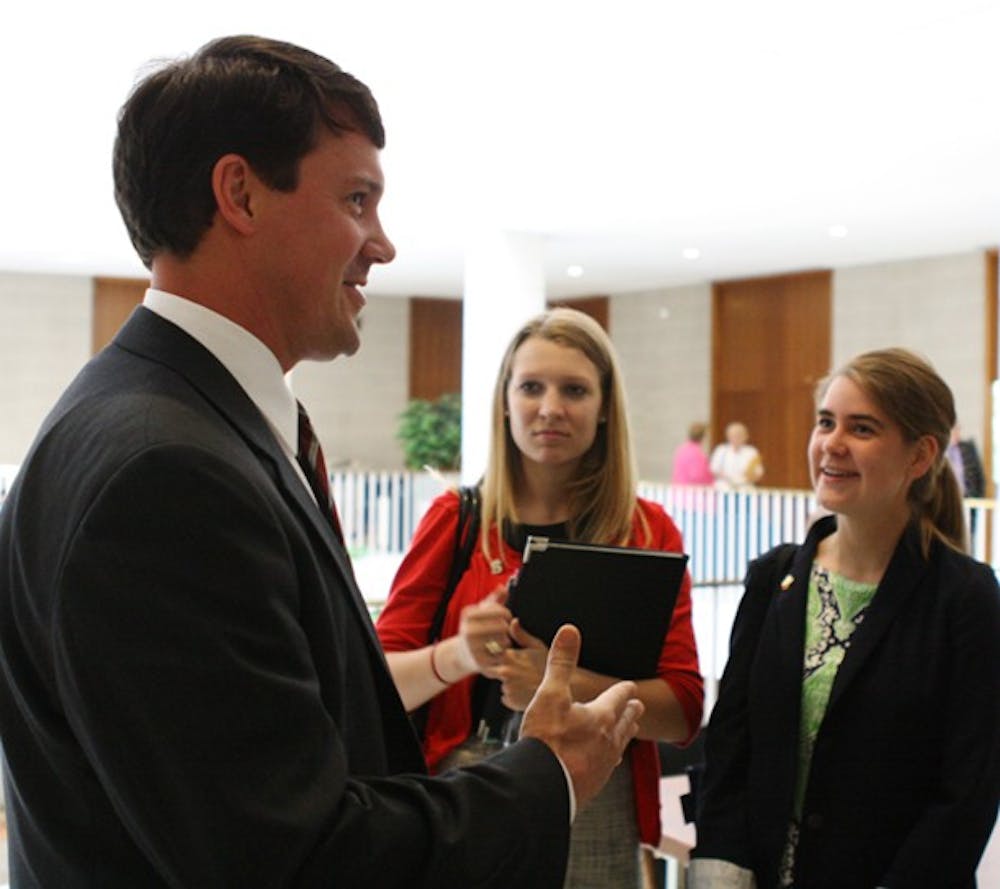“Every time that they see a constituent and see someone such as Mary speaking for a large population group, that is very helpful,” he said. “In terms of changing them, I’m not sure if you had a nuclear bomb over there you could change them.”
A legislative strategy
When the Republican leadership in the House proposed a cut of 17.4 percent or $483 million in state funding for the UNC system in April, Cooper began to meet with University administrators to learn about the impact of the cut and determine a course of action.
Her first step was to form a student listserv and send emails urging students to contact legislators in their districts before important votes on the budget. About 900 students joined the listserv before the end of the semester, she said.
Her staff sent emails to students before representatives voted on the House budget in early May, but it passed with bipartisan support and the 17.4 percent cut still intact.
The Senate then began working on its version of the budget, and some senators said they were aiming to spend less on education than their counterparts in the House. So Cooper decided to take action, traveling to the legislature on Tuesdays with members of her staff to advocate for lower funding cuts to universities.
Cooper said she has met with more than 20 senators both formally and informally in the past three weeks. Though a reduction in funding might be unavoidable, the cuts and their effect on students can be minimized, she said.
“It’s my job to say that these cuts will damage them,” she said. “If I don’t come in and remind people about the importance of education, then I’m not doing my job.”
The Senate’s budget does restore some funding to the UNC system, calling for a 12 percent cut or $347 million for universities. Cooper said her small role in lessening the cuts for the system is part of a larger lobbying effort that includes other student body presidents, chancellors and system President Thomas Ross.
Sen. Dan Soucek, R-Alexander and one of the senators who Cooper has met with, said he enjoys meeting with students like Cooper that put a face to the difficulties universities cope with in troubled economic times.
“They are the people who are being affected right now,” he said. “They are some of the sharpest students I’ve run across.”
Soucek, who serves the district in which Appalachian State University is located, said talking with university students and administrators influenced him to suggest lower cuts for the system during committee meetings. The school’s administration was not prepared for a cut higher than 15 percent, he said.
To get the day's news and headlines in your inbox each morning, sign up for our email newsletters.
“They kept describing that cut as being from difficult to harmful — or even catastrophic,” he said.
A target of 10 percent
Though the Senate’s budget would provide some relief for universities, Cooper said she had hoped legislators would settle on the University administration’s target of a more manageable cut of 10 percent. And the budget would reduce funding for the system’s need-based financial aid program by $37.9 million.
Sen. Jim Davis, R-Cherokee and another senator that met with Cooper in his office, said he hadn’t talked with any students before Cooper, but that it’s important to keep the state’s budget shortfall of $2.4 billion in perspective.
“We got elected to come down here and try to make a difference for the state,” he said. “What’s the use of giving you an education if the state is broke?”
Davis said the state’s deficit makes it difficult to further decrease funding cuts for the UNC system, and tuition increases will likely be the only solution for cash-strapped universities.
“We just have to get our fiscal house in order, and then we’ll be allowed to better fund programs that work,” he said.
Cooper said she will continue to meet with legislators while the House and Senate conference on a final budget to send to Gov. Bev Perdue’s desk. Perdue could veto the bill, lengthening the budget debate and delaying action on potential supplemental tuition increases for university students.
Students on the listserv were encouraged in an email Tuesday to contact the governor’s office in support of a veto.
Contact the State & National Editor at state@dailytarheel.com.



